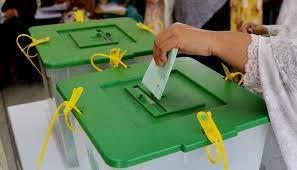Anees Takar
MARDAN: In a proactive initiative towards civic engagement, Islamic Girls College in Baghdada, organized a mock exercise on the voting process ahead of the upcoming elections.
The event took place on February 8, where male students actively participated to understand the intricacies of casting their votes.
Under the collaborative efforts of the Step Organization, a non-governmental organization focused on civic awareness, Mohammad Ismail, representing the organization, highlighted the importance of educating voters on the election process. The mock exercise aimed to guide voters through the essential steps they would encounter on Election Day.
The video session conducted by the Step Organization shed light on the four crucial stages that voters need to navigate during the election process. The first stage involves the polling officer verifying the voters’ identity by checking their original ID card and cross-referencing details in the electoral list.
The second stage unfolds with a loud call-out of the voter’s name and serial number. Subsequently, the voter’s name is struck off from the electoral list. Following this, the voter’s thumb impression is taken, and ink is applied as an additional verification step. Mohammad Ismail clarified that different-colored ballot papers would be used for the National Assembly and Provincial Assembly elections – green for the former and white for the latter. Voters are instructed to verify the official stamp and signature on the back of the ballot paper, ensuring its authenticity.
The voter then proceeds to the designated voting assistant, who, with a stamp, seals the ballot paper behind a privacy screen. Finally, the voter places the sealed ballot paper into the corresponding colored box – green for the National Assembly and white for the Provincial Assembly. Ismail emphasized that only votes cast on the original ID card would be considered valid.
However, he mentioned that voters with expired IDs would still be permitted to vote, addressing a potential concern. The educational exercise aimed to familiarize participants with the voting process’s nuances, from the application of ink to the significance of colored ballot papers. Ismail also clarified that the thumb impression would serve as the primary means of casting a vote, with excess ID cards being an alternative option.
The mock exercise provided an opportunity for students to actively engage with the democratic process, fostering a sense of responsibility and awareness.







